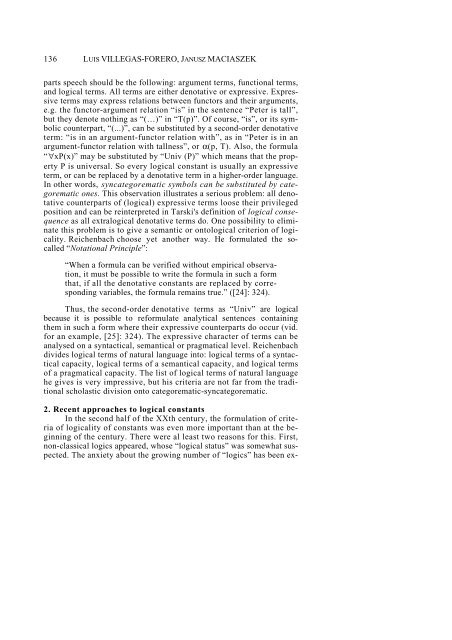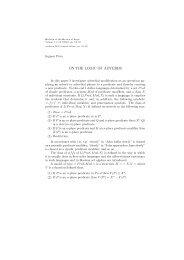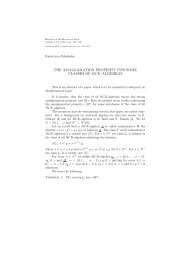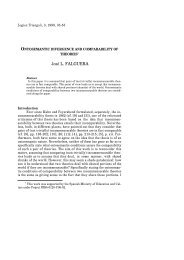Luis VILLEGAS-FORERO, Janusz MACIASZEK
Luis VILLEGAS-FORERO, Janusz MACIASZEK
Luis VILLEGAS-FORERO, Janusz MACIASZEK
Create successful ePaper yourself
Turn your PDF publications into a flip-book with our unique Google optimized e-Paper software.
136 LUIS <strong>VILLEGAS</strong>-<strong>FORERO</strong>, JANUSZ <strong>MACIASZEK</strong><br />
parts speech should be the following: argument terms, functional terms,<br />
and logical terms. All terms are either denotative or expressive. Expressive<br />
terms may express relations between functors and their arguments,<br />
e.g. the functor-argument relation “is” in the sentence “Peter is tall”,<br />
but they denote nothing as “(…)” in “T(p)”. Of course, “is”, or its symbolic<br />
counterpart, “(...)”, can be substituted by a second-order denotative<br />
term: “is in an argument-functor relation with”, as in “Peter is in an<br />
argument-functor relation with tallness”, or α(p, T). Also, the formula<br />
“∀xP(x)” may be substituted by “Univ (P)” which means that the property<br />
P is universal. So every logical constant is usually an expressive<br />
term, or can be replaced by a denotative term in a higher-order language.<br />
In other words, syncategorematic symbols can be substituted by categorematic<br />
ones. This observation illustrates a serious problem: all denotative<br />
counterparts of (logical) expressive terms loose their privileged<br />
position and can be reinterpreted in Tarski's definition of logical consequence<br />
as all extralogical denotative terms do. One possibility to eliminate<br />
this problem is to give a semantic or ontological criterion of logicality.<br />
Reichenbach choose yet another way. He formulated the socalled<br />
“Notational Principle”:<br />
“When a formula can be verified without empirical observation,<br />
it must be possible to write the formula in such a form<br />
that, if all the denotative constants are replaced by corresponding<br />
variables, the formula remains true.” ([24]: 324).<br />
Thus, the second-order denotative terms as “Univ” are logical<br />
because it is possible to reformulate analytical sentences containing<br />
them in such a form where their expressive counterparts do occur (vid.<br />
for an example, [25]: 324). The expressive character of terms can be<br />
analysed on a syntactical, semantical or pragmatical level. Reichenbach<br />
divides logical terms of natural language into: logical terms of a syntactical<br />
capacity, logical terms of a semantical capacity, and logical terms<br />
of a pragmatical capacity. The list of logical terms of natural language<br />
he gives is very impressive, but his criteria are not far from the traditional<br />
scholastic division onto categorematic-syncategorematic.<br />
2. Recent approaches to logical constants<br />
In the second half of the XXth century, the formulation of criteria<br />
of logicality of constants was even more important than at the beginning<br />
of the century. There were al least two reasons for this. First,<br />
non-classical logics appeared, whose “logical status” was somewhat suspected.<br />
The anxiety about the growing number of “logics” has been ex-






